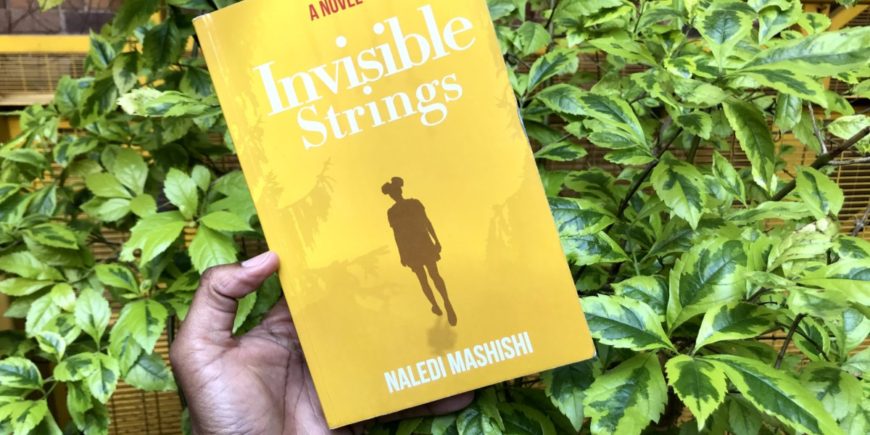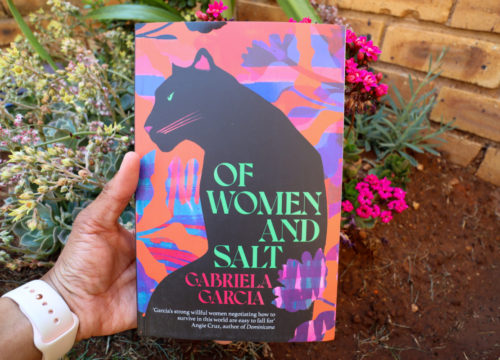Book Synopsis:
A spoiled and self-absorbed Mamokgethi Pule’s life is brought to an abrupt halt by an unplanned pregnancy. As her daughter Thato grows, she begins to develop otherworldly powers ranging from visions, to seeing the dead, to healing by touch. A young pastor, Solomon Khumalo, is desperate to prove himself by preaching the word of God to a large and loyal congregation. When he discovers Thato’s powers, he makes Mamokgethi a tempting offer: in exchange for money, he would pass off Thato’s healing powers as his own.
As the pastor’s popularity and thirst for power grows, Thato finds herself increasingly haunted by the past. The ripples of a family tragedy are still felt 30 years later, and the burden of solving it rests on young Thato’s shoulders. Invisible Strings is a story about the past bleeding into the present, the living and the dead, and the use of religion to mask sinister intentions.
“There is a lot of harm that is done in the name of religion.”
– Naledi Mashishi
My thoughts on the book:
Mamokgethi (Kgethi) had an unplanned pregnancy in her first year of varsity – and gave birth to Thato, who has other-worldly powers. With strong themes ranging from child abuse, trauma, religion, and sexual abuse – it will be hard to talk about the book while trying to not give spoilers. But let me try to mention everything I loved about the book.
As Thato grows, the family realize that with the gift that Thato has of finding lost items, comes seeing dead people and the power to heal things. What follows is a ride of a book.
- The fact that everyone’s character had a background story, one could make the image of who they were before everything spiralled. Even Solomon, Moruti wa Tsotsi had a background – a history of who he truly was before he became who he was towards Thato, his congregation and people around him. He was a human, and he was led by greed and a desire to be powerful.
- I enjoyed the solidness of the afterlife theme in this story. I was holding my breath throughout the book wondering what the ghosts went through before they passed. I was scared in parts, for Thato as a young girl seeing ghosts.
- The transgenerational trauma that the characters went through due to apartheid and all the injustices that took place. I feel she really did some research on how families navigated life after losing a loved one, or living with the fact that a loved one went missing and was never found. She communicated the silence between parents and siblings so well. The silence was so much between this family, even Ntatemogolo’s hurt was articulated well.
- The sense of loss throughout the story, from people around Thato losing personal items, loss of innocence, loss in general was very strong throughout. Even with the ghosts – their loss was very clear.
- Showing the way new age pastors and prophets take congregations for a ride was used well. Solomon as a villain is many pastors/prophets in many of our communities using the bible to do vile things and take advantage of their “power”. Naledi explores religious fanaticism quite vividly.
- Naledi wrote the Thato, Kgethi and Mahlatse characters so well for me. It made me reflect on my role as a mother and how I raise my children – and how I truly treat them. Kgethi’s character was hard to like. She had moments of willing herself to feel something for her own daughter. To me, that explained a lot of her behaviour towards Thato when the story progressed and she and Solomon did what they did. She really waited till it was too late to change – if she actually did change. I don’t think she did. Circumstances forced her to reflect. The mother-daughter relations shown in this book had a good backstory – as Koko also struggled as a mother and then Mahlatse as well had her own battles as a mother and wife. If only mothers could talk to their children – the silence doesn’t help any situation at all. Motherhood as a theme came out strongly in this book.
- Naledi does a great job in taking the reader between the different times in the 4 parts in the book. I wasn’t confused throughout, I just kept wanting to know what happened next.
- The use of the colour yellow was also a bit of a sparkle amidst the “darkness” in this book. I love the imagery throughout with the colour yellow, the flowers at the end of it and how the colour yellow was tied to the story. The dog was also a winner for me.
- Overall enjoyed how the themes in this book will be a great discussion point for reading groups and #bookclubsofSA.
Now, onto what I didn’t like, which made me not give this book a full 5 stars:
- Uncle Molefi’s part of the story felt like it wasn’t explored enough. Without spoiling, I see what the author wanted to do and to show how society judges without wanting to understand and love their family members who lead a different life than their own. Ntatemogolo and Molefi’s strained relationship, that loss of a relationship to me I felt needed to be shown more light.
- Again, Uncle Molefi being a favourite character and his story just fading when it comes to what happened with his former lover. Gosh, I am aching for more from Uncle Molefi. But alas.
So a solid 4.5 stars for this brilliant debut – looking forward to what Naledi will be working on next, even if it is in the next two years like she said at the launch.
Book is available for purchase on blackbirdbooks.africa directly and the book is available in e-book format on Snapplify, Amazon Kindle and Google Books. Thank you to the Blackbird Books team for gifting me this book for an honest review.
Take a look at what happened at the book launch of Invisible Strings. I was pleasantly shocked that this launch was fully packed and people bought the book. A job well done to The Cheeky Natives duo, Dr. Alma Cele and Advocate Letlhogonolo Mokgoroane who hosted this launch. Look out for their podcast on their socials.







